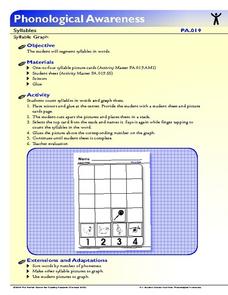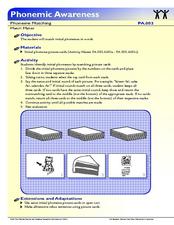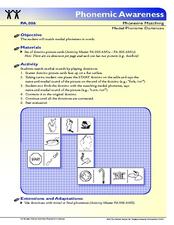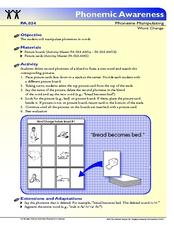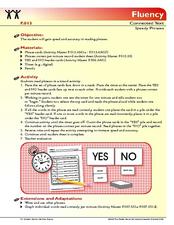Florida Center for Reading Research
Fluency: Letter-Sound Correspondence, Make a Match
A memory activity engages young learners in letter-sound correspondence. Pairs take turns examining two sets of cards lying face down. They flip one image card and one letter card, then name the initial sound. If the sounds match, pupils...
Florida Center for Reading Research
Phonological Awareness: Rhyme, Rhyme Closed Sort
A rhyming activity challenges scholars to sort picture cards according to their rhyme. Four picture cards line up across the top of a pocket chart. Learners take turns choosing from a face-down stack of picture cards and sort them...
Florida Center for Reading Research
Rhyme Pie
Being able to recognize rhyming words is a step closer to understanding the phonemic blends that are necessary for building early reading skills. Little learners use the provided picture cards to make a rhyming pie. They glue rhyming...
Florida Center for Reading Research
Phonological Awareness: Rhyme, Rhyming Game
Scholars practice their rhyming skills with a game. Players roll dice to move along the board game, stopping to rhyme words and find a match.
Florida Center for Reading Research
Phonological Awareness: Syllables, Syllable Graph
Scholars make a pictograph based on the number of syllables in each picture card. They choose a card, say the name of the object on the card, break the word into syllables, count the syllables, then glue the picture onto the number chart...
Florida Center for Reading Research
Phonological Awareness: Sentence Segmentation, Nursery Rhymes
What makes a complete sentence? Words, of course! As your budding readers understand this relationship, guide them through this nursery rhyme activity. Scholars examine pictures of 10 familiar rhymes, mentally counting the words in the...
Florida Center for Reading Research
Phonological Awareness: Phoneme Matching, Sound Train
Make a phonics train filled with matching initial phonemes. Early readers say the name of the objects on each of their cards, identify the initial letter sounds or phonemes, then paste them on a train. They make three trains, which means...
Florida Center for Reading Research
Phonological Awareness: Phoneme Matching, Pack-a-Backpack
Scholars sort words based on their initial phoneme or sound. Learners are given two backpacks, each with a picture card; they search and match picture cards with the same initial sound as the ones on each backpack.
Florida Center for Reading Research
Phonological Awareness: Phoneme Matching, Match Maker
Pre-readers identify and match initial phonemes. Scholars take turns choosing one card from each of the three stacks. They say the name of the image on the card, then keep whichever cards have a matching initial phoneme.
Florida Center for Reading Research
Phonological Awareness: Phoneme Matching, Sound Pie
Develop phonological awareness by challenging pupils to recognize final sounds in familiar words. Using magazines or other print resources, scholars search for pictures of words with the same final sound as a starter picture. Once they...
Florida Center for Reading Research
Phonological Awareness: Phoneme Matching, Medial Phoneme Dominoes
Matching medial phonemes can be as easy as playing a game of dominoes! These dominoes contain pictures of items children can say. As they say each word aloud, they work to match the medial sound to one on an adjacent card. Just like real...
Florida Center for Reading Research
Phonological Awareness: Phoneme Matching, Medial Match
Early readers get together and match medial phonemes. They take turns picking picture cards from a pile; they say each word, then determine whether the pair has matching medial sounds.
Florida Center for Reading Research
Phonological Awareness: Phoneme Manipulating, Word Change
Once your scholars know their letter sounds and recognize them in words, have them try making new words by manipulating phonemes. Pupils are given a word change picture board and a stack of word pictures. They pick a card and place it...
Florida Center for Reading Research
Phonological Awareness: Phoneme Manipulating, What's Left?
Scholars subtract initial phonemes from given picture word cards to create new words. Feet becomes eat, and shelf becomes elf.
Florida Center for Reading Research
Phonics: Onset and Rime, Word-Roll-A-Rama
Learners roll two die; die one contains various onsets, and die two contains different rimes. They write down the onset and rime pair they get, then blend and read their word.
Florida Center for Reading Research
Fluency: Words, Word Climb
Just like climbing a mountain, little learners read to reach the top. They take turns picking high-frequency word cards, reading them, then matching them to the words on their mountain worksheet. They race to reach the top of the...
Florida Center for Reading Research
Fluency: Connected Text, Speedy Phrases
Pairs help each other with reading fluency using phrase flashcards! Learners take turns reading short phrases aloud. They have one minute to read as many correctly as possible while their partner sorts the cards into a yes or no pile. At...
Florida Center for Reading Research
Fluency: Connected Text, Repeated Timed Reading
There are many different ways to build accuracy and fluency when reading. This exercise employs repetition and timed drills to get the job done. Learners time each other as they read a passage, recording each other's time and accuracy.
August House
The Archer and the Sun
Reinforce reading comprehension with a instructional activity about The Archer and the Sun, a Chinese folktale. Kids learn some background information about Chinese culture before reading the story, and answer literacy questions as they...
Teach Engineering
Watt Meters to Measure Energy Consumption
It used watt amount of energy? This resource investigates the power usage of small household appliances. Using a watt meter, groups measure the actual wattage used by an appliance and then calculate the energy used daily.
The New York Times
Looking for Answers: Making Sense of the Boston Marathon Bombing
How should America respond to acts of domestic terrorism? What motivates or prompts a terrorist attack? After reading an opinion piece on the 2013 Boston Marathon bombing, your learners will critically analyze factors that could have...
Berkshire Museum
Camouflage!: Collecting Data and Concealing Color
Help young scholars see the important role camouflage plays in the survival of animals with a fun science lesson. Starting with an outdoor activity, children take on the role of hungry birds as they search for worms represented by...
Berkshire Museum
Backyard Rocks
You don't have to travel far to learn about rocks, just step outside, pick up a stone, and begin investigating. After taking a class walk around the school grounds collecting rocks, young scientists practice their skills of observation...
Berkshire Museum
Reduce, Reuse, and Recycle: Sorting Through Personal Choices
Raise children's awareness about the importance of conservation with this hands-on science lesson. Start by breaking the class into groups and having them collect trash from around the school or local park. Students then use the provided...
Other popular searches
- Arm Extension
- Ussr Extension Activities
- Extension Cord
- Cosmetology Hair Extensions
- Cooperative Extension
- 7 Continent Extensions
- Decimal Addition Extension
- Writing Extensions
- Extension Activities
- Story Extensions
- Gifted Extensions
- Extension Elements






